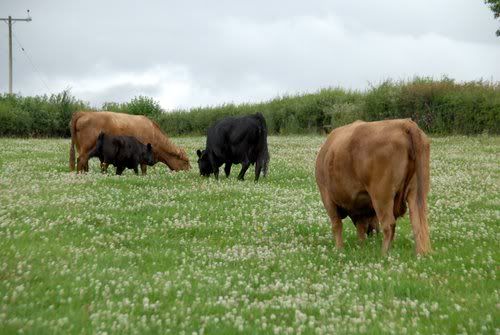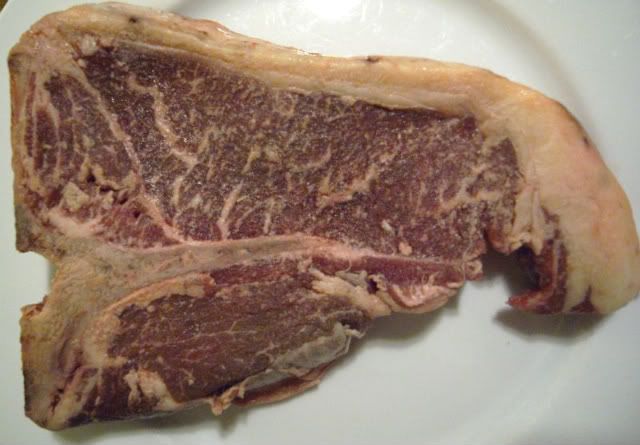Page 1 of 1
Posted: Fri Jul 10, 2009 3:01 pm
by Saffy
One of our fields seems to have a bit more clover every year, thank goodness it is white clover not red, we have never used the dreaded red clover. However as you can see from the pic there is now little else on this small field than white clover and the cows needed a change badly. We put them on there tentatively last Friday morning and the one dun was back out cooling her heels on the starvation patch by evening as she was blowing up. We tried again the next day but she started to inflate again, so she is now with the youngstock. The others are loving it though and no problems, in fact they are already gaining weight, just one week later.

Stephanie
Posted: Fri Jul 10, 2009 3:52 pm
by redhill
Hello Stephanie,
Our fields are white with clover at the moment,
the girls seem to cope quite well, there are round tummies in the evening, but no real problems, with much burping, gurgling, and generally destroying the ozone layer above Lydney.
That is except Goldust , who can blow up like a balloon if left to her own devices, a pint of cooking oil works wonders, you can see the bloat subsiding, halter, pull head back and pour the bottle into the side of the mouth is the best method we have found, though we are feeding her a handful of mag. rolls, in the morning and again in the evening , and so far this year she's been ok.
Sue Castlemears Herd
Posted: Fri Jul 10, 2009 5:35 pm
by monica waltho
We have alot of white clover, last year we regularly had cows bloated but we never had to treat any. The first time I noticed it was when Nelly a dun who's very greedy kept walking backwards- just uncomfortable I guess, I was quite concerned but I went back about 1/2 later to find she was fine. I had several blow up but were usually fine in about an hour. Bloat can of course be life threatening but after this I dont panic quite so much I just check often and provding they are not getting any worse have left well alone
Posted: Fri Jul 10, 2009 6:43 pm
by Broomcroft
We have a lot of white clover and we have to put nitrogen on at the moment in the spring to encourage the grass to compete, which works well. When we had too much clover cows did bloat and we moved them off every other day or so for half a day onto a starvation field. May be not ideal but it worked.
BUT, and a big BUT. We had two cows that put on weight very easily indeed. Both had to be put down because they eventually started prolapsing from both rear orifices even though not even pregnant. We couldn't get them pregnant I'm glad to say.
Our slimmer, more dairy type dexters do really, really well on the clover/grass mix. My perfect farm would actually be the grass and clover leys, with slightly dairy'ish type dexters and a really good beef bull whether cross or otherwise.
Maybe you need to stitch a bit more grass in during Aug after it has been grazed right down?
Edited By Broomcroft on 1247247877
Posted: Fri Jul 10, 2009 7:05 pm
by Duncan MacIntyre
Clover causes bloat because it produces froth in the rumen, and instead of free gas at the inlet from the gullet the froth does not trigger eructation (there's a good word, though burping would do!). It will not come up a tube either, so passing a tube into the stomach tends to do nothing, whereas bloat caused by obstruction such as potato is easily cured by passing a tube. The cooking oil works by reducing the surface tension in the bubbles and letting the froth go down, and the gas is brought up as usual. There are also some very good bottles such as "Birp" available. If you are grazing cattle on rich clover - they can blow up very very quickly and an acute frothy bloat is as much an emergency in my book as a staggers.
Duncan
Posted: Sat Jul 11, 2009 6:26 am
by Broomcroft
White clover produces beef and milk with far more omega-3 than just grass. Milk from cows on clover is supposed to be especially good for your health. It also adds to the marbling of the meat considerably. Our steers are finished on leys and forage heavy in clover for 18 months after weaning. The flavour can be awesome; we think because of the clover:

This steak is from a steer that had been finished on grass-clover forage that had been wilted for just 24 hours, so maintaining it's omega=3 levels, which otherwise deplete greatly with wilting. We couldn't stack the bales because they were a bit floppy. The protein level of the forage was almost the same as hard feed at 13-14% and the energy was off the scale so we had to ration it.
Edited By Broomcroft on 1247290197
Posted: Sat Jul 11, 2009 9:32 am
by Saffy
Very interesting Clive!
I knew that clover was good for quality of meat and for marbling and also that to some extent it helps milking cows maintain body weight whilst keeping the solids up in the milk, I didn't know about the omega 3 in the milk though. My Father was very ahead of his time with his farming here years ago and we had - I think it would have been ICI here, with different mixes of grasses etc way back in the 60s and early 70s, to see which grass was best for what. Also we looked - even then into wilting times and the effects but not on omega 3 levels.
Stephanie
Posted: Sat Jul 11, 2009 4:32 pm
by Broomcroft
Omega-3 in milk, cheese, yoghurt and meat is there for the very same reasons that it is in fish. It's the green leaves that contain the good fatty acids, as in the sea it is contained in the algae. That's why grass-fed beef, presumably other meats and grass-based dairy products are supposed to be good for you rather than bad (in moderation I would say). My research says that as wilting takes place, the green dies away as do the fatty acids, so the quicker you can bale, the better the forage is from that point of view.
Milk from cattle fed good levels of white clover have 2/3rd more good fatty acids in their milk that those fed purely on grass.
If you're interested, I maintain a site called www.grassfed.co.uk which is just a load of links to all sorts of info but nothing on making forage with regards to fatty acids yet. Sorry to go off on one on this subject but it is why we farm. We chose Dexters, apart from taste, because of their ability to produce what I would call healthy, natural beef.


